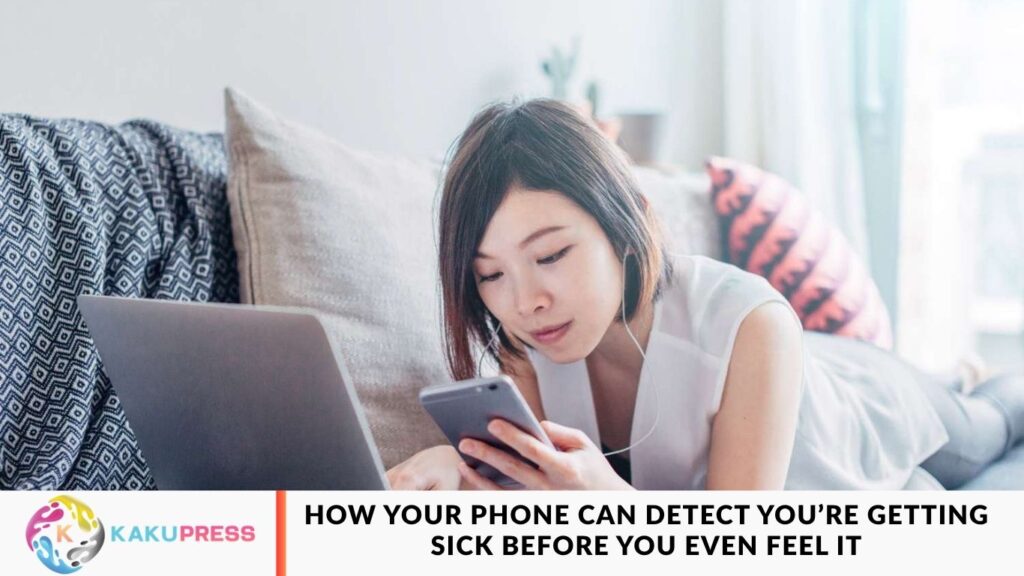In today’s hyper-connected world, your smartphone is much more than a device for calls, texts, or social media. It’s quietly becoming a personal health tracker, constantly collecting data about your daily habits, movements, sleep, and even emotional state. As surprising as it sounds, your phone might be able to detect signs of illness before you even feel sick.
Smartphones Are Quietly Watching Your Health Patterns
Modern smartphones are equipped with powerful sensors — including accelerometers, GPS, microphones, and heart rate monitors. These tools continuously record how you move, sleep, type, and interact with your environment. When combined with machine learning algorithms and AI health tracking, this data can reveal subtle physiological or behavioral changes that occur before physical symptoms appear.
For example, your phone may notice:
- A sudden drop in physical activity signals fatigue or early illness.
- Late-night screen time spikes, suggesting insomnia or a fever.
- Slower typing speed or increased typos, suggesting cognitive fatigue.
- Changes in speech tone, pace, or clarity may indicate stress or respiratory issues.
Some health apps can even analyze your breathing or coughing sounds through the phone’s microphone to detect respiratory illnesses, including early indicators of conditions like COVID-19.
How Phones Use AI to Spot What You Don’t Notice
What makes this emerging technology revolutionary is its ability to detect patterns that humans often miss. You might not realize you’re walking slower, sleeping longer, or talking differently — but your smartphone’s AI does.
By establishing a personal baseline of your normal behaviors, your phone can flag deviations that suggest something is off. This allows for early intervention and preventive health actions before symptoms escalate.
Why Predictive Health Tracking Matters
This type of passive health monitoring could transform healthcare as we know it. Imagine getting an alert from your phone suggesting you rest or consult a doctor — before your body even tells you it’s time.
Potential benefits include:
- Early illness detection allows for faster treatment.
- Personalized wellness insights, based on real behavioral data.
- Remote health monitoring gives doctors continuous, real-time feedback.
- Community-level health analytics, helping authorities predict outbreaks and track public health trends.
The Privacy Dilemma: Who Owns Your Health Data?
However, this breakthrough also raises serious privacy concerns. Health-related data is among the most sensitive personal information you own. As smartphones become more capable of diagnosing illness, questions arise:
- Who controls this data?
- How securely is it stored?
- Can it be shared or sold without consent?
For these technologies to work ethically, transparency, data security, and user consent must remain non-negotiable. Users should always have the right to know what’s being collected, how it’s used, and who has access to it.
Read more: Ethical Questions Surrounding AI’s Role in Reviving Lost Languages
The Future of AI and Digital Wellness
The idea that your phone can sense illness before you do isn’t science fiction anymore — it’s a glimpse into the future of predictive healthcare. As AI-driven health monitoring continues to evolve, smartphones could become as essential to healthcare as thermometers and stethoscopes once were.
Still, the balance between innovation and privacy will define how society embraces this next chapter in digital wellness.
Your phone already knows your habits — soon, it might just help keep you healthier, longer, and one step ahead of illness.
Frequently Asked Questions
How can a phone tell if I’m getting sick?
Smartphones use built-in sensors and AI algorithms to track your movements, sleep, typing speed, and voice patterns. Subtle changes in these behaviors can indicate early signs of illness before physical symptoms appear.
What kind of data does my phone collect to detect illness?
Your phone gathers data from accelerometers, GPS, microphones, and sometimes heart rate sensors to monitor daily routines such as activity levels, speech tone, and sleep cycles.
Can my phone detect COVID-19 or other respiratory illnesses?
Some health apps can analyze breathing patterns or coughing sounds using your phone’s microphone to detect early signs of respiratory conditions, including possible COVID-19 symptoms.
Does my phone use AI or machine learning to predict illness?
Yes. AI and machine learning analyze your personal behavioral data over time, spotting deviations from your normal patterns that may signal fatigue, fever, or other health issues.
Is it safe for my phone to collect health data?
Health tracking features can be safe if apps follow strict privacy policies. Always check app permissions, avoid sharing sensitive data unnecessarily, and use trusted sources for health monitoring.
Can my phone help me take preventive health measures?
Absolutely. By alerting you to early changes in your behavior or physical patterns, your phone can help you rest, hydrate, or seek medical advice before your symptoms worsen.
Do all smartphones have this health detection capability?
Not all phones have advanced health tracking yet, but many modern models — especially those paired with smartwatches — include built-in sensors that can track key wellness metrics.
Conclusion
Your smartphone is quickly becoming more than just a communication device — it’s evolving into a powerful tool for predictive health monitoring. By analyzing subtle patterns in your movement, speech, sleep, and daily habits, you can often spot signs of illness before you feel them. This fusion of AI, sensors, and behavioral data marks a major step forward in digital wellness and personalized healthcare.

